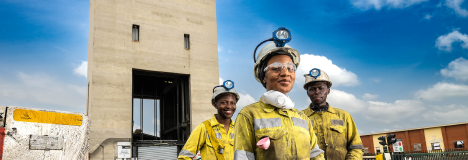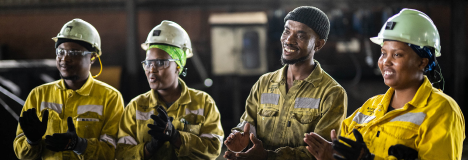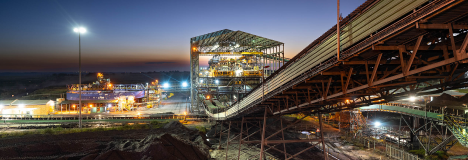
Host communities are critical stakeholders as they experience both the positive and negative impacts associated with every stage of the mining lifecycle.
Their support underpins our social licence to operate and is earned through our commitment to being a trusted social partner, by building positive relationships, and upholding our responsibility to leave a legacy that lasts beyond the life of our mines. We endeavour to ensure that our actions do not negatively impact local communities, today and post-closure.
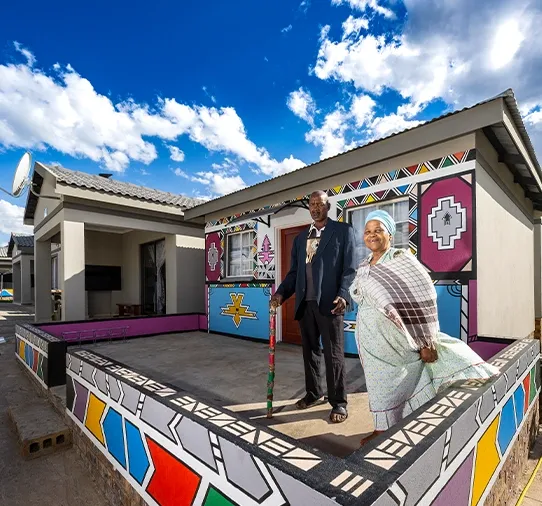
The Thungela Social Policy guides our approach to managing social risks, impacts and benefits, and is rooted in international best practice standards and local legislation. Among these standards are those set by the International Finance Corporation (IFC), the International Council on Mining and Metals’ Good Practice Guide on Indigenous Peoples and Mining, the United Nations Guiding Principles on Business and Human Rights, the Voluntary Principles on Security and Human Rights and Australia’s Native Title Act.
Key elements of the policy include social governance, risk and impact management, stakeholder engagement, socio-economic development, social incidents and grievance mechanisms, social and human rights impacts, emergency preparedness and response, cultural heritage, and land acquisition and involuntary resettlement.
Effective implementation of the policy is a cornerstone of our approach. In early 2024, our sites each underwent a baseline assessment to evaluate their initial performance against the policy. This was followed by an independent social assurance process at the end of the year to track progress. Key improvement areas include clearer definitions of social risks and more effective evaluation of controls. Greater emphasis will also need to be placed on needs analysis and baseline assessments so that we can better measure programme impacts.
The governance of social policy implementation at board level has been entrusted to the social, ethics, and transformation committee, which convenes quarterly to oversee social performance. This responsibility also extends to the chief executive officer, executive committee, site general managers, and their respective leadership teams.
Each site has a social performance specialist operating under the guidance of a regional social performance manager. Sites establish social performance management committees (SPMC), led by general managers and attended by the mine’s head of departments and the functional heads of multiple disciplines, such as social performance, environment, safety, human resources and protection services. These committees convene monthly to monitor the progress of implementation, covering areas such as inclusive procurement, risk management, grievance resolution, Social and Labour Plan (SLP) execution, and enterprise and supplier development. On average, these meetings have an attendance rate of 67%.
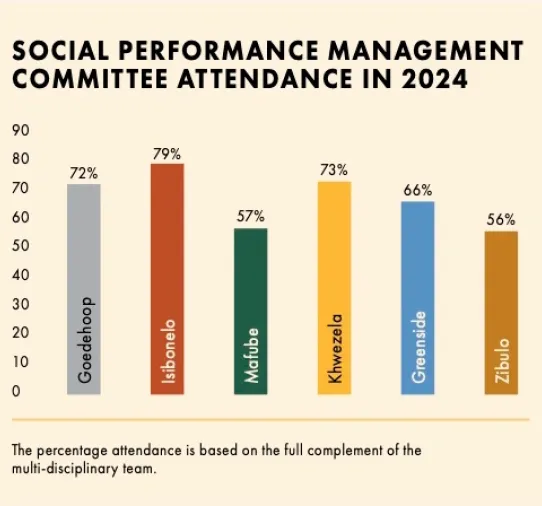
We acknowledge that mining can have negative impacts on host communities and make every effort to minimise these by ensuring that our sites work to the highest operational standards.
A formal grievance mechanism is in place to ensure that community grievances and concerns are addressed in a timely manner. This mechanism – and the procedure for reporting, investigation, feedback and appeals, is communicated via various engagement channels, including community engagement forums, our community newsletter and through the employee induction process.
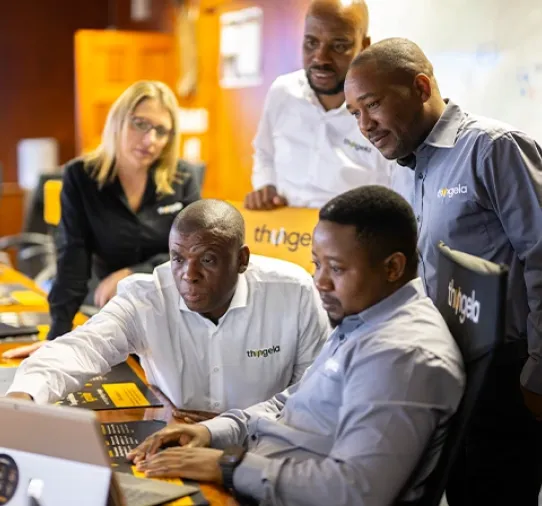
In 2024, 75 grievances were logged on our incident management system (2023: 94). Of these, 18 related to dust and blasting and 23 to demands for employment and supplier opportunities. These resulted in 21 incidents of protest action compared to 29 in 2023.
A total of 16LA level 3 to 5 incidents with social consequences occurred in 2024. Fourteen of those were classified as level 3 and two as level 4 compared to 16 level 3s in 2023.
Two of the five level 3 to 5 incidents were community protests that escalated to violence — one outside our Zibulo North Shaft, where injuries were sustained by two community members, and another close to our Centralised Services precinct.
Tragically, a motorist attempting to pass through the latter demonstration discharged a firearm, which resulted in the death of a protester. In both incidents, the protests were related to subcontracting and employment opportunities.
Investigations into both incidents were carried out by the South African Police Service and our internal security team. We adhere to established standards for managing protest action. Learnings gained from these incidents have been incorporated into existing management controls.


